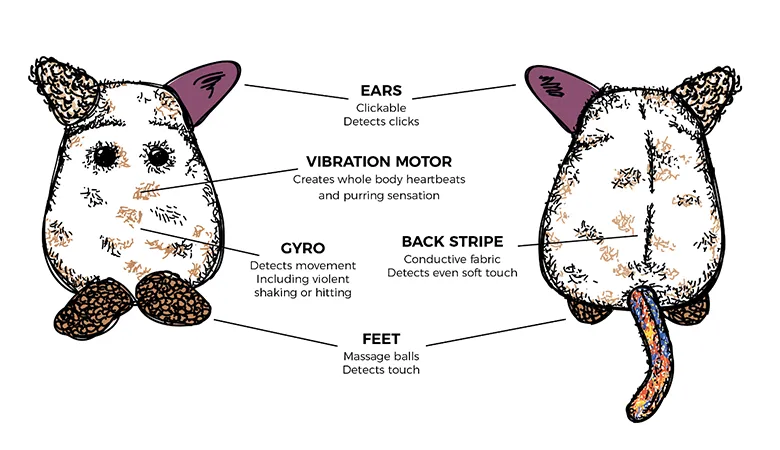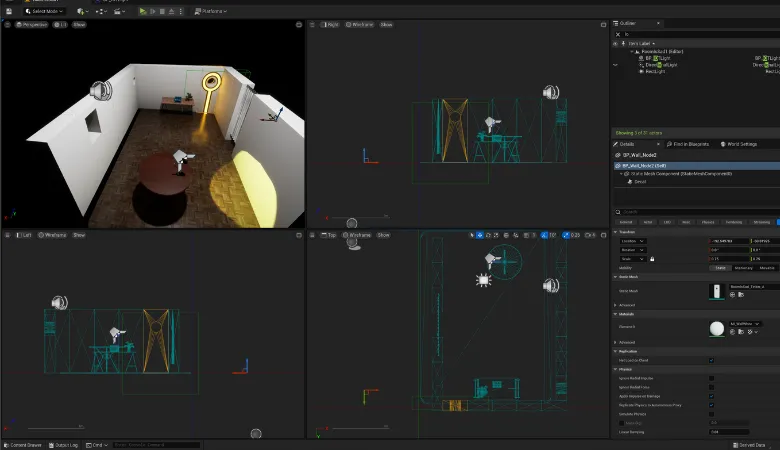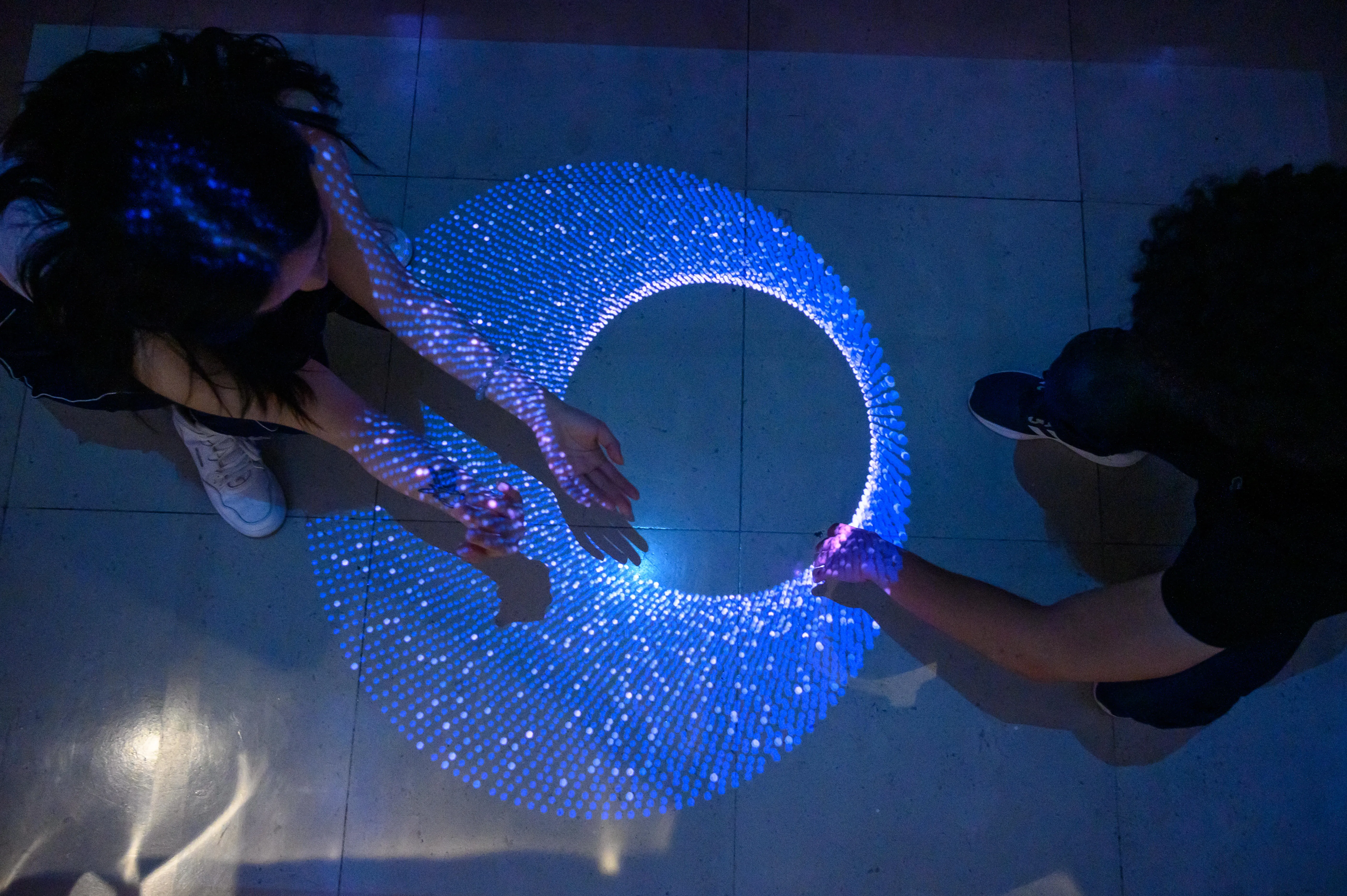Exploring the Frontier: New Exhibition to Delve into Challenges and Opportunities of Emerging Technologies
King’s Culture and the Digital Futures Institute present Seeking Connection: Living Well with Technology, an exhibition exploring the different ways we could learn to live well with technology and navigate opportunities for meaningful connections with ourselves, our communities and our planet.
From the smallest cell to the vastness of the planet and beyond, the works on display in the Arcade, Bush House from 1 November 2023 – 26 January 2024 are all examples of transformational research taking place across King’s that interrogate new and emerging technologies.
Exhibitions and public engagement programmes help us to cultivate a deeper understanding of how world-leading research and innovation impacts all our daily lives. The theme of ‘Seeking Connection’ speaks to King’s commitment to understanding how we might live well with current and emerging technologies, and I am delighted we can exhibit these projects that respond to current global challenges for the King’s community and beyond to experience.
Professor Shitij Kapur, President & Principal of King’s College London
The exhibition will be complemented by an exciting public talks and events programme designed to delve deeper into emerging digital technologies, including the challenges and opportunities that arise from them.
EXPLORE THE TALKS AND EVENTS PROGRAMME HERE.
The pieces in this exhibition show what an important part technologies have to play in our long and ongoing dialogue about what it means to live well, helping us to pay attention to the things that matter to us, better.
Professor Steven Connor, Director of Research, Digital Futures Institute
ABOUT THE EXHIBITION
Visitors to the exhibition will meet Purrble, a cuddly smart toy designed to guide regulation of the emotions for young people struggling with their mental health. Purrble has a dynamic heartbeat and responds to touch, enabling anxious users to calm themselves as they soothe their companion.
Dr Petr Slovak, Dr A. Jess Williams, Dr Seray Ibrahim, Nikki Theofanopoulou, Melina Petsolari, Phoebe Staab, Faculty of Natural, Mathematical & Engineering Sciences, King’s College London
 Purrble is desgined with a dynamic heartbeat and responds to touch
Purrble is desgined with a dynamic heartbeat and responds to touch
The art piece Decoding Difference highlights the positive role that digital technologies can play in improving life quality of disabled people. The lights mirror the artist Zoe Partington-Beck’s changing blood glucose levels, transmitted from an implant in her body that allows her to manage her life with diabetes, a hidden impairment, and other people’s negative perceptions. The piece was created as part of ongoing research exploring how museums in the UK make their art collections accessible to blind and partially sighted visitors.
Zoe Partington-Beck, Dr Katharina C. Husemann, Craig Clarke, Beatroot AV, King’s Business School, King’s College London
Artist sketch of ‘Decoding Difference’ (c) Zoe Partington-Beck
Increasing numbers of older adults experience feelings of loneliness, leading to poorer physical and mental health. The installation Deloneliness and accompanying film explores how smart systems might hold the solution via sensors that monitor loneliness levels, which could be used to identify when support is needed and improve quality of life.
Prof Wei Liu, Prof Sebastien Ourselin, Prof Anthea Tinker, Prof Yu Shi, Dr Faith Matcham, Dr Michela Antonelli, Dr Freya Probst, Dr Jessica Rees, Dr Nikitia Mexia, Dr Erika Molteni, Faculty of Natural, Mathematical & Engineering Sciences; Faculty of Life Sciences & Medicine; Faculty of Social Science & Public Policy, King’s College London in collaboration with University of Leeds and University of Sussex
Diagram showing smart systems as a solution for monitoring loneliness
Room is Sad is an interactive, immersive experience that uses AI and smart home technology to tell the story of a smart room that isn’t feeling quite itself. Room has been made ‘smart’ for our own convenience, but has now begun to develop confusing feelings of its own. In this piece, visitors can step inside, speak to Room, and explore questions of autonomy, consciousness, and intelligence as you help Room uncover what might be wrong.
Elliott Hall, Charisma.AI, King’s Digital Lab, Faculty of Arts and Humanities, King’s College London

In the video installation Sentinels, a tree in an English forest is told the story of a group of young Colombians who went to court to protect the Amazon rainforest. Whilst they were victorious in court — the judge granted legal rights to the rainforest — the consequences of the judgement were severe for the subsistence farming communities who lived in the Amazon. This short extract of a longer film serves as a reminder of the communicative gap that exists between us and other species… a gap, however, that technology is beginning to bridge.
Dr Emily Barritt, Mark Knightley, Crowded Room Theatre Company,The Dickson Poon School of Law, King’s College London
 Still from the film ‘Sentinels’
Still from the film ‘Sentinels’
How can generative soundscape composition enable different perspectives on forests in an era of planetary crisis? In forestscapes, a listening lab explores how sound can serve as a medium for collective inquiry into forests as living cultural landscapes.
Dr Jonathan Gray, Dr Maud Borie, Anna Smith, Angela YT Chan, Desiree Foerster, Kapil Yadav, Samantha Day, Liliana Bounegru and Andrés Saenz de Sicilia and collaborators. A collaboration between the Department of Geography, the Department of Digital Humanities, the Centre for Digital Culture, the Centre for Attention Studies, the Digital Futures Institute and the Environmental Humanities Network at King’s College London together with the Public Data Lab, with support from the UK’s Natural Environmental Research Council.

Finally, Particle Sanctum asks how can we relate to invisible cosmic forces in the world around us. Using two cosmic ray detectors in this gallery, the projection and soundscape is a visualisation of live readings from Super-Kamiokande neutrino observatory in Japan. The work aims to make these mysterious forces from deep in the cosmos tangible, and to illustrate how digital technologies can dramatically bring together different scales of existence.
Dr Teppei Katori, Christo Squier, Chris Ball, Eden Morrison, Faculty of Natural, Mathematical & Engineering Sciences, King’s College London
 Particle Sanctum (c) David Tett
Particle Sanctum (c) David Tett
Technology is simultaneously lauded for enabling and slammed for destroying human connection. This exhibition enables the viewer to explore this contradiction from the inside. Come see what you think and feel about this central issue of our times.
Professor Marion Thain, Executive Dean, Faculty of Arts & Humanities, and Chair-Director of Digital Futures Institute
The pieces in Seeking Connection: Living Well with Technology remind us that technological advancements alone will never solve the human quest for connection, and asks urgent questions about how they might best be employed to help us understand ourselves and each other. Underpinning the inventive exhibits are a set of transformative interdisciplinary research collaborations, which we are delighted to present to a new audience to generate new ideas and conversations about how we make the most of these rapidly changing digital technologies.
Beatrice Pembroke, Executive Director, King’s Culture

